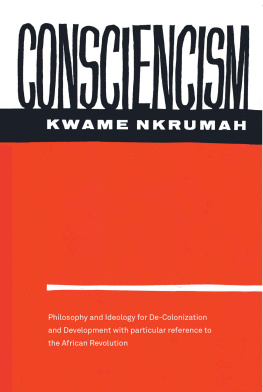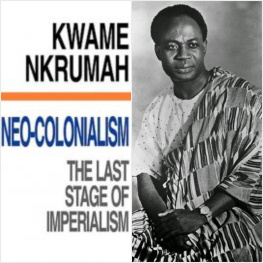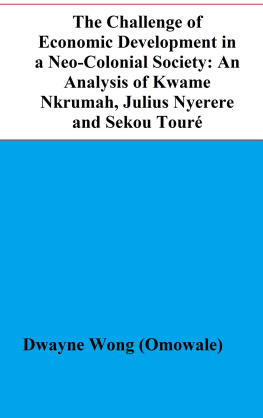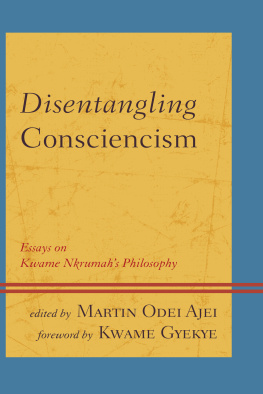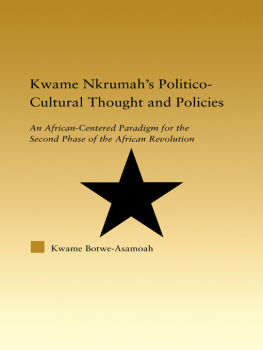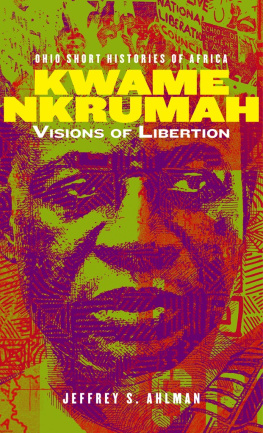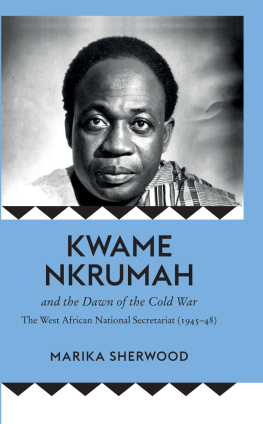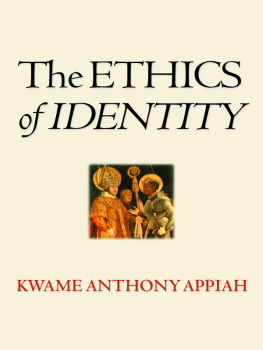Kwame Nkrumah - Consciencism
Here you can read online Kwame Nkrumah - Consciencism full text of the book (entire story) in english for free. Download pdf and epub, get meaning, cover and reviews about this ebook. year: 2018, publisher: Monthly Review Press, genre: Religion. Description of the work, (preface) as well as reviews are available. Best literature library LitArk.com created for fans of good reading and offers a wide selection of genres:
Romance novel
Science fiction
Adventure
Detective
Science
History
Home and family
Prose
Art
Politics
Computer
Non-fiction
Religion
Business
Children
Humor
Choose a favorite category and find really read worthwhile books. Enjoy immersion in the world of imagination, feel the emotions of the characters or learn something new for yourself, make an fascinating discovery.
- Book:Consciencism
- Author:
- Publisher:Monthly Review Press
- Genre:
- Year:2018
- Rating:5 / 5
- Favourites:Add to favourites
- Your mark:
- 100
- 1
- 2
- 3
- 4
- 5
Consciencism: summary, description and annotation
We offer to read an annotation, description, summary or preface (depends on what the author of the book "Consciencism" wrote himself). If you haven't found the necessary information about the book — write in the comments, we will try to find it.
Consciencism — read online for free the complete book (whole text) full work
Below is the text of the book, divided by pages. System saving the place of the last page read, allows you to conveniently read the book "Consciencism" online for free, without having to search again every time where you left off. Put a bookmark, and you can go to the page where you finished reading at any time.
Font size:
Interval:
Bookmark:
KWAME NKRUMAH

Consciencism
PHILOSOPHY AND IDEOLOGY FOR DE-COLONIZATION
Copyright 1964 by Kwame Nkrumah
Revised edition copyright 1970, 2009
by Monthly Review Press
All Rights Reserved
ISBN: 978-0-85345-136-5
Monthly Review Press
146 W. 29th Street, Suite 6W
New York, NY 10001
www.monthlyreview.org
CONTENTS

AUTHORS NOTE
S INCE THE publication of the first edition of Consciencism in 1964, the African Revolution has decisively entered a new phase, the phase of armed struggle. In every part of our continent, African revolutionaries are either preparing for armed struggle, or are actively engaged in military operations against the forces of reaction and counter-revolution.
The issues are now clearer than they have ever been. The succession of military coups which have in recent years taken place in Africa, have exposed the close links between the interests of neo-colonialism and the indigenous bourgeoisie. These coups have brought into sharp relief the nature and the extent of the class struggle in Africa. Foreign monopoly capitalists are in close association with local reactionaries, and have made use of officers among the armed forces in order to frustrate the purposes of the African Revolution.
It is in consideration of the new situation in Africa that some changes have become necessary in this edition. They occur principally in .
August 15, 1969
Conakry
According to the materialist conception of history, the ultimately determining element in history is the production and reproduction of real life. More than this neither Marx nor I have ever asserted. Hence if somebody twists this into saying that the economic element is the only determining one, he transforms that proposition into a meaningless, abstract, senseless phrase. Marx and I are ourselves partly to blame for the fact that the younger people sometimes lay more stress on the economic side than is due to it. We had to emphasize the main principle vis--vis our adversaries, who denied it, and we had not always the time, the place or the opportunity to allow the other elements involved in the interaction to come into their rights. But when it was a case of presenting a section of history, that is, of a practical application, it was a different matter and there no error was possible. Unfortunately, however, it happens only too often that people think they have fully understood a new theory and can apply it without more ado from the moment they have mastered its main principles, and even those not always correctly. And I cannot exempt many of the more recent Marxists from this reproach, for the most amazing rubbish has been produced in this quarter, too.Letter from Engels to J. Bloch, London, 2122 September 1890
INTRODUCTION
T HE LINES of the partition of Africa naturally affected the education of the colonized Africans. Students from English-speaking territories went to Britain as a matter of course, just as those from French-speaking territories went to France as a matter of course. In this way, the yearning for formal education, which African students could only satisfy at great cost of effort, will, and sacrifice, was hemmed in within the confines of the colonial system.
Recoiling from this strait-jacketing, a number of us tried to study at centres outside the metropolis of our administering power. That is how America came to appeal to me as a Western country which stood refreshingly untainted by territorial colonialism in Africa. To America I therefore went; how and in what circumstances, I have already related in my autobiography, Ghana. I spent almost ten years in the United States of America, studying and working for a living; teaching and carrying out my own private researches.
The evaluation of ones own social circumstance is part of the analysis of facts and events, and this kind of evaluation is, I feel, as good a starting point of the inquiry into the relations between philosophy and society as any other. Philosophy, in understanding human society, calls for an analysis of facts and events, and an attempt to see how they fit into human life, and so how they make up human experience. In this way, philosophy, like history, can come to enrich, indeed to define, the experience of man.
The ten years which I spent in the United States of America represents a crucial period in the development of my philosophical conscience. It was at the Universities of Lincoln and Pennsylvania that this conscience was first awakened. I was introduced to the great philosophical systems of the past to which the Western universities have given their blessing, arranging and classifying them with the delicate care lavished on museum pieces. When once these systems were so handled, it was natural that they should be regarded as monuments of human intellection. And monuments, because they mark achievements at their particular point in history, soon become conservative in the impression which they make on posterity.
I was introduced to Plato, Aristotle, Descartes, Kant, Hegel, Schopenhauer, Nietzsche, Marx and other immortals, to whom I should like to refer as the university philosophers. But these titans were expounded in such a way that a student from a colony could easily find his breast agitated by conflicting attitudes. These attitudes can have effects which spread out over a whole society, should such a student finally pursue a political life.
A colonial student does not by origin belong to the intellectual history in which the university philosophers are such impressive landmarks. The colonial student can be so seduced by these attempts to give a philosophical account of the universe, that he surrenders his whole personality to them. When he does this, he loses sight of the fundamental social fact that he is a colonial subject. In this way, he omits to draw from his education and from the concern displayed by the great philosophers for human problems, anything which he might relate to the very real problem of colonial domination, which, as it happens, conditions the immediate life of every colonized African.
With single-minded devotion, the colonial student meanders through the intricacies of the philosophical systems. And yet these systems did aim at providing a philosophical account of the world in the circumstances and conditions of their time. For even philosophical systems are facts of history. By the time, however, that they come to be accepted in the universities for exposition, they have lost the vital power which they had at their first statement, they have shed their dynamism and polemic reference. This is a result of the academic treatment which they are given. The academic treatment is the result of an attitude to philosophical systems as though there was nothing to them but statements standing in logical relation to one another.
This defective approach to scholarship was suffered by different categories of colonial student. Many of them had been hand-picked and, so to say, carried certificates of worthiness with them. These were considered fit to become enlightened servants of the colonial administration. The process by which this category of student became fit usually started at an early age, for not infrequently they had lost contact early in life with their traditional background. By reason of their lack of contact with their own roots, they became prone to accept some theory of universalism, provided it was expressed in vague, mellifluous terms.
Next pageFont size:
Interval:
Bookmark:
Similar books «Consciencism»
Look at similar books to Consciencism. We have selected literature similar in name and meaning in the hope of providing readers with more options to find new, interesting, not yet read works.
Discussion, reviews of the book Consciencism and just readers' own opinions. Leave your comments, write what you think about the work, its meaning or the main characters. Specify what exactly you liked and what you didn't like, and why you think so.

